Abstract
Nulliparous women with singleton gestation were assessed prospectively for anxiety levels with the State-Trait Anxiety Inventory, which measured state (situational and transitional) and trait (dispositional and stable) anxiety, with high scores indicating high anxiety. Bivariate and multivariate methods were used for data analysis. Anxiety assessments (n = 239) were obtained in 88 women at different stages of gestation. Mean anxiety scores were lowest at 22 to 26 weeks. A woman's successive scores were highly correlated. The trait anxiety (A-T) scores were higher for married women. A positive correlation was present between anxiety scores and gestational age at delivery. Low A-T scores correlated with low birthweight, preterm delivery, and chorioamnionitis. High state anxiety (A-S) levels correlated with the presence of meconium in the amniotic fluid and neonatal congenital abnormalities. Postdate delivery also was associated with higher although statistically insignificant anxiety scores. Women who presented to the labor and delivery room for various complaints had higher A-S and A-T levels. Maternal anxiety level was associated with adverse perinatal outcome; specifically, prematurity and low birthweight correlated with low A-T levels.
Full text
PDF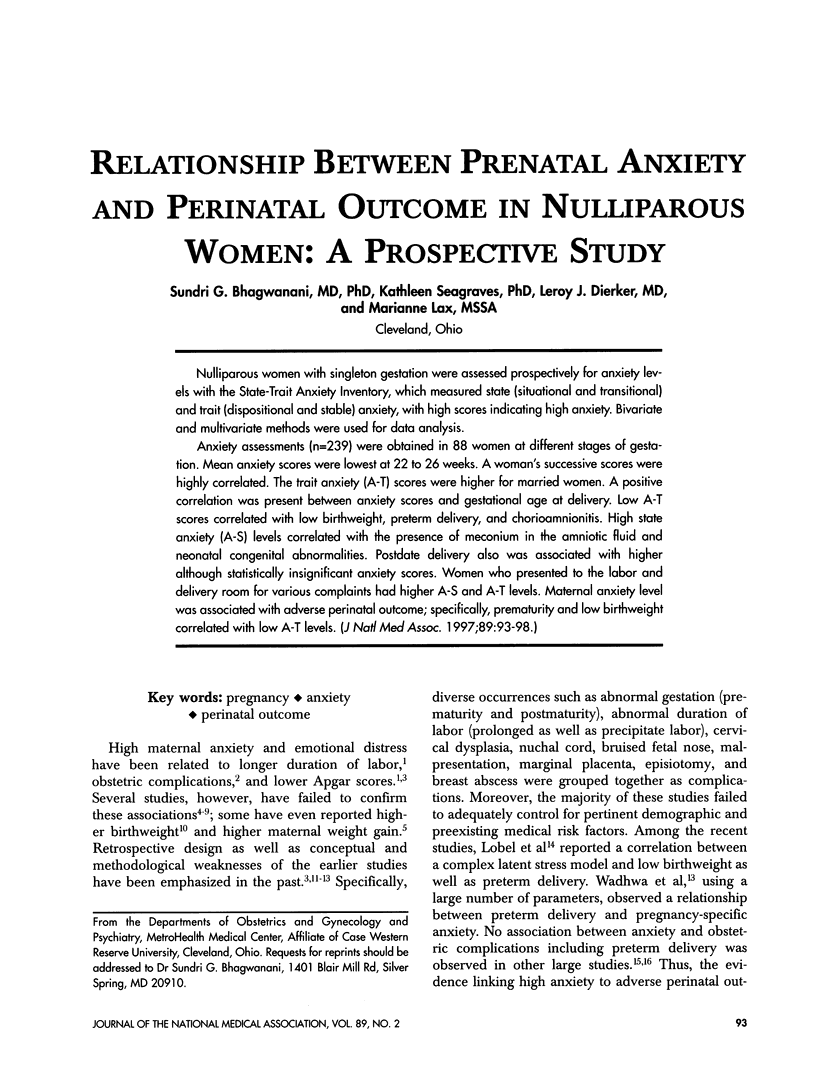
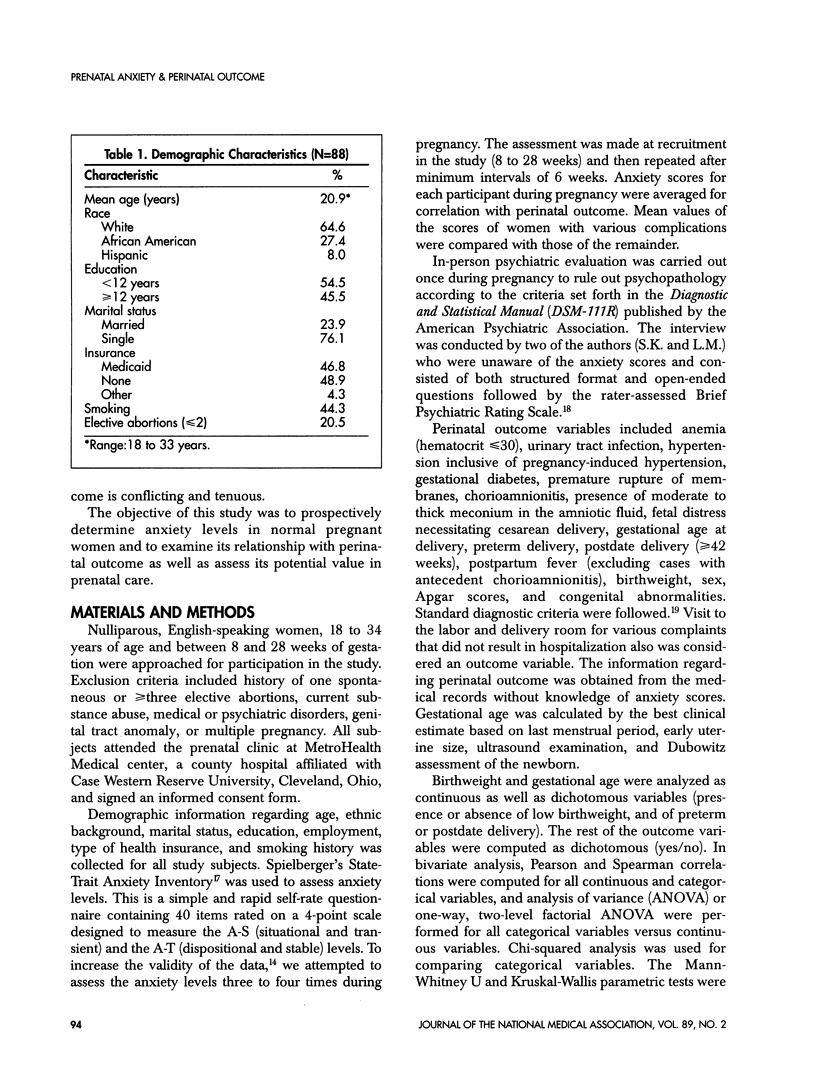
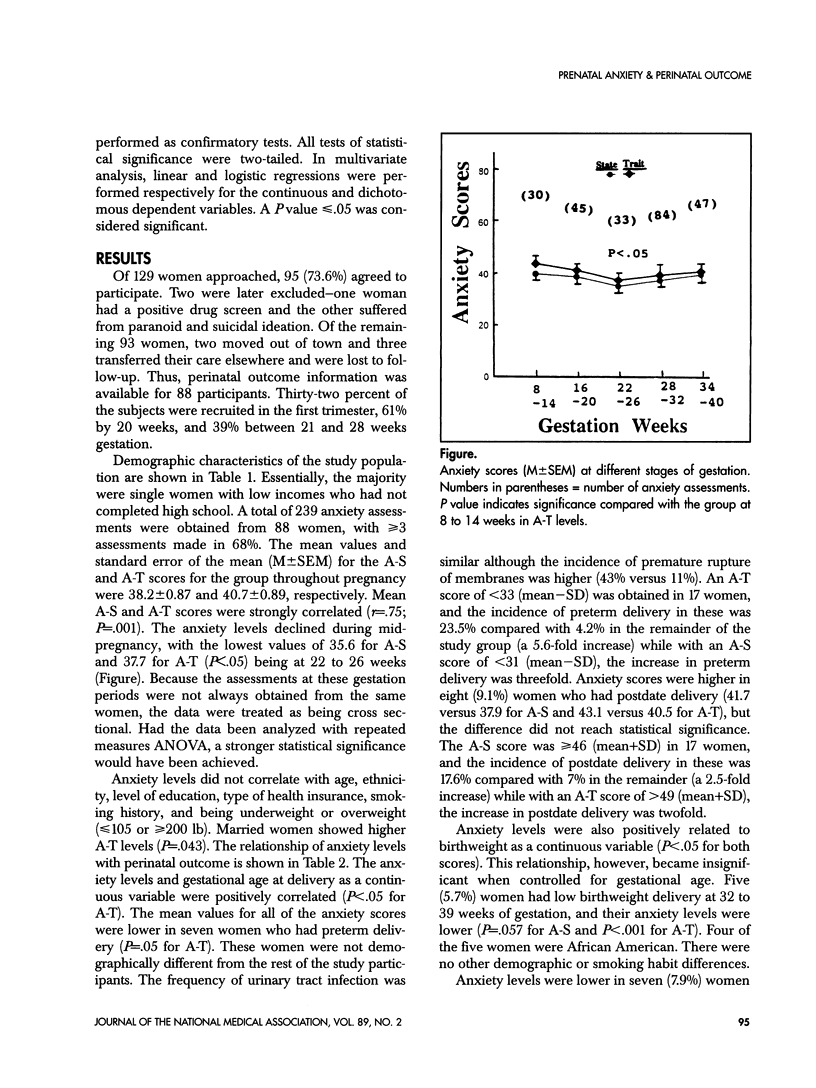
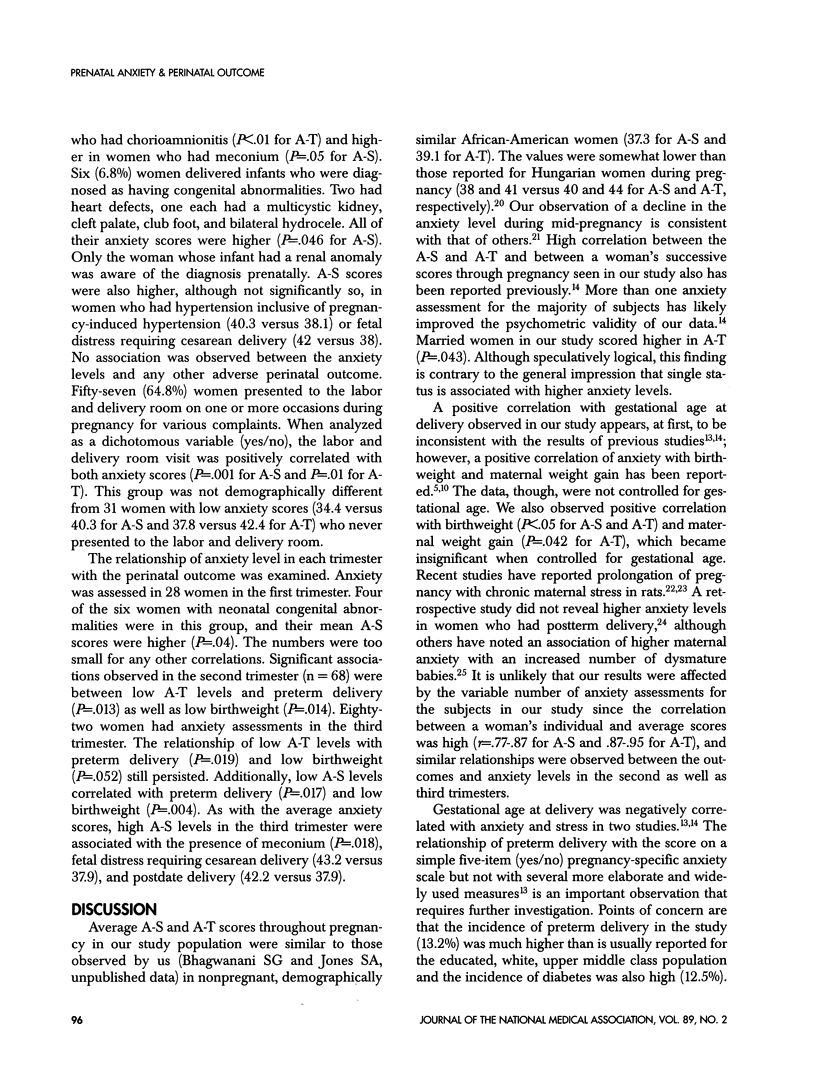
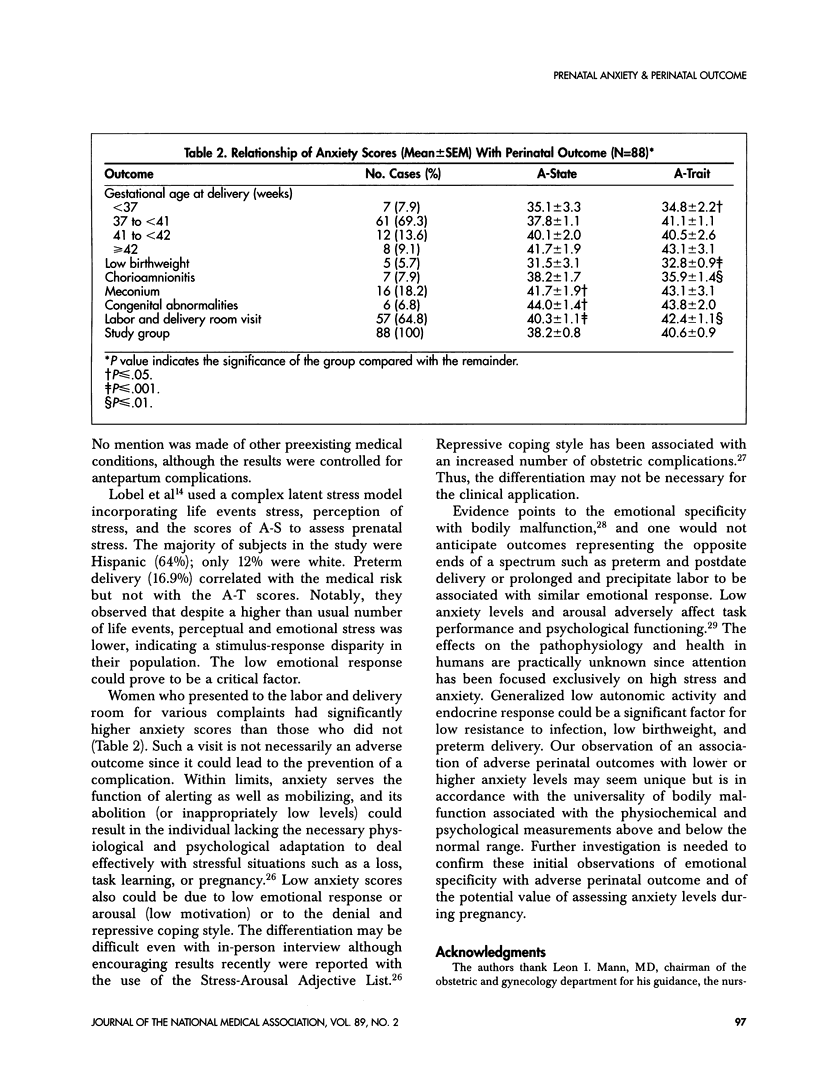
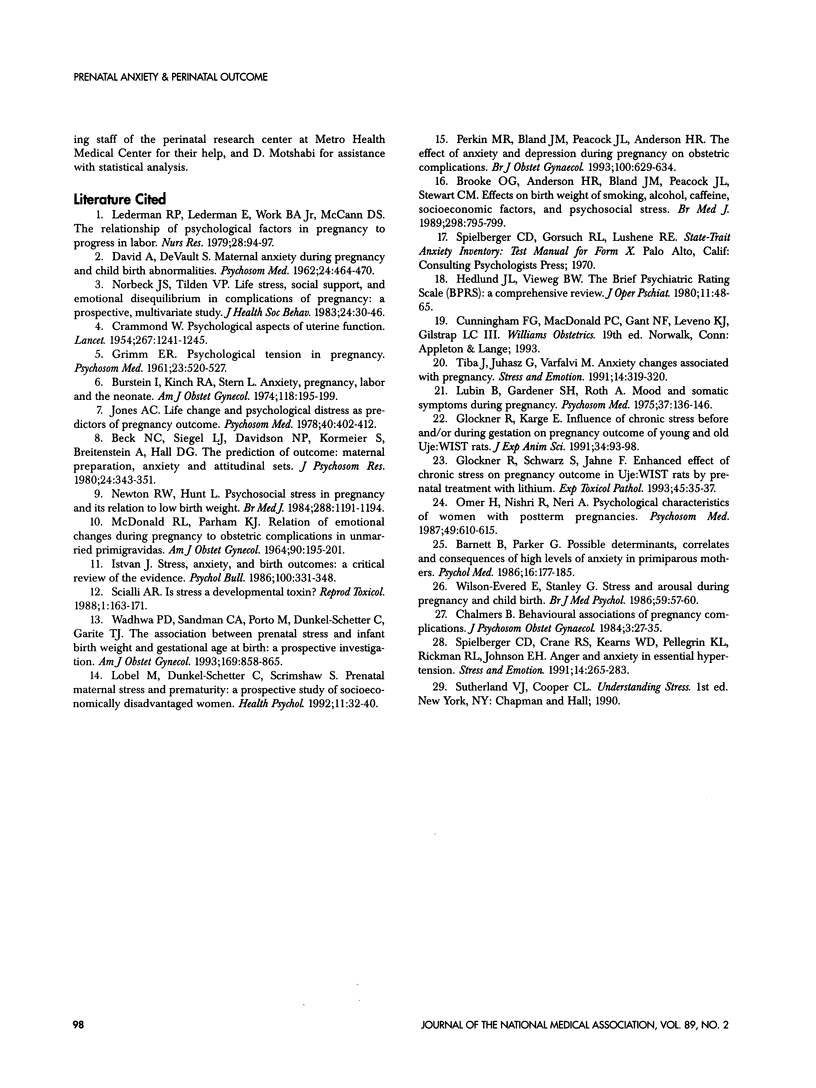
Selected References
These references are in PubMed. This may not be the complete list of references from this article.
- Barnett B., Parker G. Possible determinants, correlates and consequences of high levels of anxiety in primiparous mothers. Psychol Med. 1986 Feb;16(1):177–185. doi: 10.1017/s0033291700002610. [DOI] [PubMed] [Google Scholar]
- Beck N. C., Siegel L. J., Davidson N. P., Kormeier S., Breitenstein A., Hall D. G. The prediction of pregnancy outcome: maternal preparation, anxiety and attitudinal sets. J Psychosom Res. 1980;24(6):343–351. doi: 10.1016/0022-3999(80)90026-4. [DOI] [PubMed] [Google Scholar]
- Brooke O. G., Anderson H. R., Bland J. M., Peacock J. L., Stewart C. M. Effects on birth weight of smoking, alcohol, caffeine, socioeconomic factors, and psychosocial stress. BMJ. 1989 Mar 25;298(6676):795–801. doi: 10.1136/bmj.298.6676.795. [DOI] [PMC free article] [PubMed] [Google Scholar]
- Burstein I., Kinch R. A., Stern L. Anxiety, pregnancy, labor, and the neonate. Am J Obstet Gynecol. 1974 Jan 15;118(2):195–199. doi: 10.1016/0002-9378(74)90549-3. [DOI] [PubMed] [Google Scholar]
- CRAMOND W. A. Psychological aspects of uterine dysfunction. Lancet. 1954 Dec 18;267(6851):1241–1245. doi: 10.1016/s0140-6736(54)92044-9. [DOI] [PubMed] [Google Scholar]
- DAVIDS A., DEVAULT S. Maternal anxiety during pregnancy and childbirth abnormalities. Psychosom Med. 1962 Sep-Oct;24:464–470. doi: 10.1097/00006842-196209000-00004. [DOI] [PubMed] [Google Scholar]
- GRIMM E. R. Psychological tension in pregnancy. Psychosom Med. 1961 Nov-Dec;23:520–527. doi: 10.1097/00006842-196111000-00006. [DOI] [PubMed] [Google Scholar]
- Glöckner R., Karge E. Influence of chronic stress before and/or during gestation on pregnancy outcome of young and old Uje: WIST rats. J Exp Anim Sci. 1991;34(3):93–98. [PubMed] [Google Scholar]
- Glöckner R., Schwarz S., Jähne F. Enhanced effect of chronic stress on pregnancy outcome in Uje:WIST rats by prenatal treatment with lithium. Exp Toxicol Pathol. 1993 Feb;45(1):35–37. doi: 10.1016/S0940-2993(11)80449-5. [DOI] [PubMed] [Google Scholar]
- Istvan J. Stress, anxiety, and birth outcomes: a critical review of the evidence. Psychol Bull. 1986 Nov;100(3):331–348. [PubMed] [Google Scholar]
- Jones A. C. Life change and psychological distress as predictors of pregnancy outcome. Psychosom Med. 1978 Aug;40(5):402–412. doi: 10.1097/00006842-197808000-00004. [DOI] [PubMed] [Google Scholar]
- Lederman R. P., Lederman E., Work B. A., Jr, McCann D. S. Relationship of psychological factors in pregnancy to progress in labor. Nurs Res. 1979 Mar-Apr;28(2):94–97. [PubMed] [Google Scholar]
- Lobel M., Dunkel-Schetter C., Scrimshaw S. C. Prenatal maternal stress and prematurity: a prospective study of socioeconomically disadvantaged women. Health Psychol. 1992;11(1):32–40. doi: 10.1037//0278-6133.11.1.32. [DOI] [PubMed] [Google Scholar]
- Lubin B., Gardener S. H., Roth A. Mood and somatic symptoms during pregnancy. Psychosom Med. 1975 Mar-Apr;37(2):136–146. doi: 10.1097/00006842-197503000-00004. [DOI] [PubMed] [Google Scholar]
- MCDONALD R. L., PARHAM K. J. RELATION OF EMOTIONAL CHANGES DURING PREGNANCY TO OBSTETRIC COMPLICATIONS IN UNMARRIED PRIMIGRAVIDAS. Am J Obstet Gynecol. 1964 Sep 15;90:195–201. doi: 10.1016/0002-9378(64)90479-x. [DOI] [PubMed] [Google Scholar]
- Newton R. W., Hunt L. P. Psychosocial stress in pregnancy and its relation to low birth weight. Br Med J (Clin Res Ed) 1984 Apr 21;288(6425):1191–1194. doi: 10.1136/bmj.288.6425.1191. [DOI] [PMC free article] [PubMed] [Google Scholar]
- Norbeck J. S., Tilden V. P. Life stress, social support, and emotional disequilibrium in complications of pregnancy: a prospective, multivariate study. J Health Soc Behav. 1983 Mar;24(1):30–46. [PubMed] [Google Scholar]
- Omer H., Nishri R., Neri A. Psychological characteristics of women with postterm pregnancies. Psychosom Med. 1987 Nov-Dec;49(6):610–615. doi: 10.1097/00006842-198711000-00006. [DOI] [PubMed] [Google Scholar]
- Perkin M. R., Bland J. M., Peacock J. L., Anderson H. R. The effect of anxiety and depression during pregnancy on obstetric complications. Br J Obstet Gynaecol. 1993 Jul;100(7):629–634. doi: 10.1111/j.1471-0528.1993.tb14228.x. [DOI] [PubMed] [Google Scholar]
- Scialli A. R. Is stress a developmental toxin? Reprod Toxicol. 1987 1988;1(3):163–171. doi: 10.1016/s0890-6238(87)80028-x. [DOI] [PubMed] [Google Scholar]
- Wadhwa P. D., Sandman C. A., Porto M., Dunkel-Schetter C., Garite T. J. The association between prenatal stress and infant birth weight and gestational age at birth: a prospective investigation. Am J Obstet Gynecol. 1993 Oct;169(4):858–865. doi: 10.1016/0002-9378(93)90016-c. [DOI] [PubMed] [Google Scholar]
- Wilson-Evered E., Stanley G. Stress and arousal during pregnancy and childbirth. Br J Med Psychol. 1986 Mar;59(Pt 1):57–60. doi: 10.1111/j.2044-8341.1986.tb02665.x. [DOI] [PubMed] [Google Scholar]


